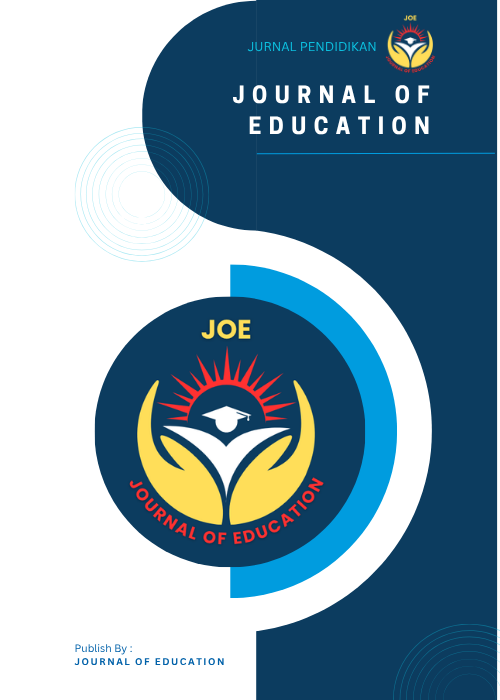Analysis of Suspense Types in Narrative Texts by Third-Semester Students at HKBP Nommensen University
Kata Kunci:
Suspense, , narrative writing,, English education,, qualitative analysis,, student narratives,Abstrak
This research examines third semester students' narrative writing with tension in the English Language Education Program at HKBP Nommensen Pematangsiantar University. This research sought students' perspectives on how they integrate tension in narratives – especially situational, psychological, and anticipatory elements. This research uses a qualitative strategy that examines 40 narrative texts to determine the type of tension and its occurrence as well as its level of significance. The results showed that anticipatory tension was the most common type, followed by situational, conflict-based, and psychological tension. This research also expands the scope of the discipline of narrative writing, especially creative story pieces to be included in curriculum activities for students.
Unduhan
Referensi
Poe, E. A. (1846). The philosophy of composition. Retrieved from https://www.gutenberg.org/files/2148/2148-h/2148-h.htm
Todorov, T. (1969). Theories of the novel. Longman.
Mckee, J. (1997). Story: Style, structure, substance, and the principles of screenwriting. Harpercollins.
Mckee, R. (1997). Story: Substance, structure, style and the principles of screenwriting. Harpercollins.
Todorov, T. (1977). Literary theory: An introduction. Routledge.
Bálint, K., Kuijpers, M. M., Doicaru, M. M., Hakemulder, F., & Tan, E. S. (2017). The effect of suspense structure on felt suspense and narrative absorption in literature and film. Narrative Absorption, 27, 177–197. DOI: https://doi.org/10.1075/lal.27.10bal
Bentz, M., Espinoza, M. C., Simeonova, V., Köppe, T., & Onea, E. (2024). Measuring suspense in real time: A new experimental methodology. SSOL, 13(1), 1–21. Https://doi.org/10.61645/ssol.182
Brewer, W. F., & Lichtenstein, E. H. (1982). Stories are to entertain: A structural-affect theory of stories. Journal of Pragmatics, 6(5-6), 473–486. Retrieved from [researchgate](https://www.researchgate.net)
Hoeken, H., & van Vliet, M. (2000). Suspense, curiosity, and surprise: How discourse structure influences the affective and cognitive processing of a story. Poetics, 27(4), 277–286. Retrieved from [Poetics Journal](https://aclanthology.org)
Green, M. C., & Brock, T. C. (2000). The role of transportation in the persuasiveness of public narratives. Journal of Personality and Social Psychology, 79(5), 701–721.
Gerrig, R. J. (1993). Experiencing narrative worlds: On the psychological activities of reading. Yale University Press.
Fiveable. (n.d.). Types of Suspense in Literature. Retrieved from [https://library.fiveable.me](https://library.fiveable.me)
Smith, R. (2020). The Psychology of Suspense. Crimereads. Retrieved from [https://crimereads.com/the-psychology-of-suspense](https://crimereads.com/the-psychology-of-suspense)
Wargo, A. (2020). The Science of Suspense: How It Works and Why We Love It. Frontiers in Psychology. Retrieved from
[https://www.frontiersin.org/articles/10.3389/fpsyg.2020.00479/full](https://www.frontiersin.org/articles/10.3389/fpsyg.2020.00479/full)
Smith, R. (2020). The Psychology of Suspense. Crimereads. Retrieved from [https://crimereads.com/the-psychology-of-suspense](https://crimereads.com/the-psychology-of-suspense)
Fiveable. (n.d.). Types of Suspense in Literature. Retrieved from [https://library.fiveable.me](https://library.fiveable.me)
Wargo, A. (2020). The Science of Suspense: How It Works and Why We Love It. Frontiers in Psychology. Retrieved from
[https://www.frontiersin.org/articles/10.3389/fpsyg.2020.00479/full](https://www.frontiersin.org/articles/10.3389/fpsyg.2020.00479/full)
Fiveable. (n.d.). Types of Suspense in Literature. Retrieved from [https://library.fiveable.me](https://library.fiveable.me)
Smith, R. (2020). The Psychology of Suspense. Crimereads. Retrieved from [https://crimereads.com/the-psychology-of-suspense](https://crimereads.com/the-psychology-of-suspense)
Unduhan
Diterbitkan
Versi
- 2024-12-25 (4)
- 2024-11-28 (3)
- 2024-11-26 (2)
- 2024-11-26 (1)
Terbitan
Bagian
##category.category##
Lisensi
Hak Cipta (c) 2024 Journal Of Education

Artikel ini berlisensi Creative Commons Attribution-NonCommercial 4.0 International License.
Artikel akan berlisensi jika memenuhi aturan yang berlaku di journal of education









